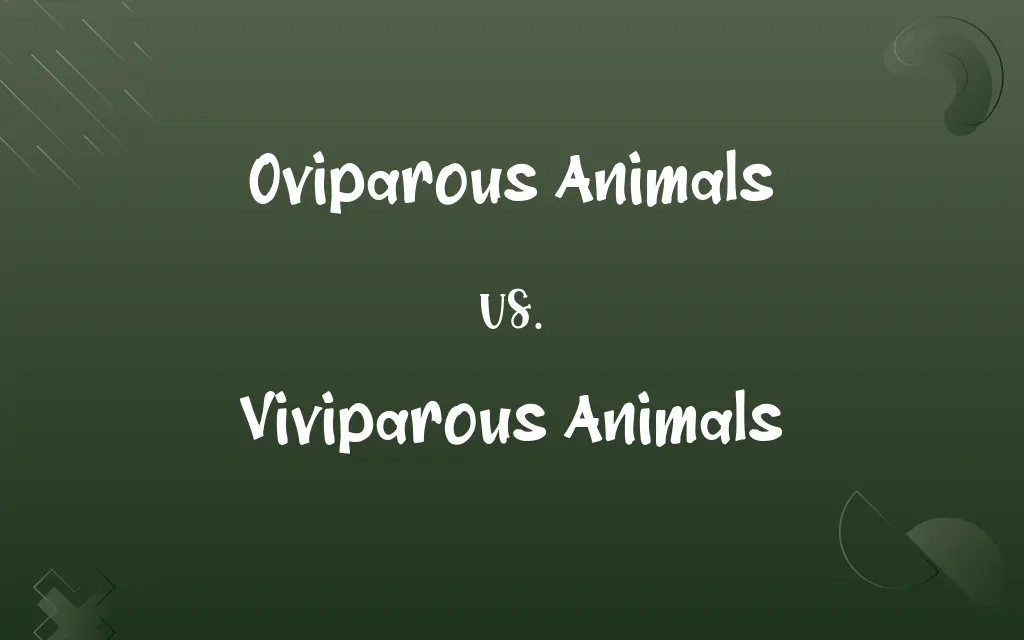Oviparous Animals vs. Viviparous Animals: Know the Difference

By Shumaila Saeed || Published on January 27, 2024
Oviparous animals lay eggs with little to no embryonic development inside the mother, while viviparous animals give birth to live young, developing embryos inside the mother.

Key Differences
Oviparous animals, including most birds, reptiles, and fish, lay eggs outside their bodies. The embryos develop and receive nourishment from the egg's yolk. In contrast, viviparous animals, like most mammals, carry their embryos internally, providing direct nourishment through a placenta or similar structure.
Shumaila Saeed
Jan 27, 2024
In oviparous species, external factors like temperature can significantly influence the development and survival of the eggs. On the other hand, viviparous animals can regulate the developmental environment internally, offering more stability and protection to the developing embryo.
Shumaila Saeed
Jan 27, 2024
Parental care in oviparous animals varies greatly; some abandon their eggs after laying, while others guard and incubate them. Viviparous animals often show higher levels of parental care post-birth, as the offspring are more dependent on the mother for initial survival.
Shumaila Saeed
Jan 27, 2024
Oviparous reproduction allows for a larger number of offspring per reproductive cycle, but with generally lower survival rates. Viviparous reproduction usually results in fewer offspring but with higher individual survival chances due to the more controlled developmental environment and parental care.
Shumaila Saeed
Jan 27, 2024
The evolutionary paths of these reproductive strategies reflect adaptations to environmental pressures. Oviparous animals can inhabit a wider range of environments due to the less demanding nature of egg-laying, whereas viviparous animals are often more specialized and adapted to specific ecological niches.
Shumaila Saeed
Jan 27, 2024
ADVERTISEMENT
Comparison Chart
Embryonic Development Location
Outside the mother's body
Inside the mother's body
Shumaila Saeed
Jan 27, 2024
Parental Care Variation
Ranges from none to extensive (egg care)
Generally more intensive post-birth care
Shumaila Saeed
Jan 27, 2024
ADVERTISEMENT
Oviparous Animals and Viviparous Animals Definitions
Oviparous Animals
Species where offspring development occurs in an external egg.
Frogs are oviparous, laying eggs in water.
Shumaila Saeed
Jan 10, 2024
Viviparous Animals
Creatures that bear live young, providing direct nourishment pre-birth.
Kangaroos are viviparous, with a unique pouch for newborns.
Shumaila Saeed
Jan 10, 2024
Oviparous Animals
Animals that lay eggs with embryos developing outside the mother.
Chickens are oviparous animals, laying eggs almost daily.
Shumaila Saeed
Jan 10, 2024
Viviparous Animals
Animals with internal embryonic development and live birth.
Dogs are viviparous, nurturing their puppies inside the body before birth.
Shumaila Saeed
Jan 10, 2024
Oviparous Animals
Egg-laying animals with varying degrees of parental care for eggs.
Birds, as oviparous animals, often build nests to protect their eggs.
Shumaila Saeed
Jan 10, 2024
ADVERTISEMENT
Viviparous Animals
Animals that give birth to live young, nurturing embryos internally.
Humans are viviparous, carrying their young in the womb.
Shumaila Saeed
Jan 10, 2024
Oviparous Animals
Species in which the female deposits eggs in a safe environment.
Turtles lay their eggs on sandy beaches, characteristic of oviparous animals.
Shumaila Saeed
Jan 10, 2024
Viviparous Animals
Species where offspring develop inside the mother, linked by a placenta.
Dolphins, as viviparous mammals, nurse their young in utero.
Shumaila Saeed
Jan 10, 2024
Oviparous Animals
Creatures whose young hatch from eggs external to the maternal body.
Many fish are oviparous, releasing eggs into the water.
Shumaila Saeed
Jan 10, 2024
Viviparous Animals
Species characterized by prolonged gestation and fewer offspring.
Elephants are viviparous, with long gestation periods.
Shumaila Saeed
Jan 10, 2024
Repeatedly Asked Queries
Can oviparous animals regulate the temperature of their eggs?
Some can, through behaviors like nest building or incubation.
Shumaila Saeed
Jan 27, 2024
Do oviparous animals have shorter gestation periods?
Yes, since development occurs outside the body, gestation is often shorter.
Shumaila Saeed
Jan 27, 2024
Can oviparous animals have internal fertilization?
Yes, many species have internal fertilization before egg laying.
Shumaila Saeed
Jan 27, 2024
What defines an oviparous animal?
An oviparous animal lays eggs with external embryonic development.
Shumaila Saeed
Jan 27, 2024
Is egg-laying exclusive to oviparous animals?
Primarily, although some viviparous species lay eggs (e.g., platypus).
Shumaila Saeed
Jan 27, 2024
Are viviparous offspring more developed at birth?
Typically, they are more developed and require immediate care.
Shumaila Saeed
Jan 27, 2024
Is the survival rate higher for viviparous offspring?
Generally, yes, due to the protection and care provided during development.
Shumaila Saeed
Jan 27, 2024
Are all mammals viviparous?
Most are, except for monotremes like the platypus.
Shumaila Saeed
Jan 27, 2024
Do viviparous animals provide nutrients to embryos?
Yes, typically through a placenta or similar structure.
Shumaila Saeed
Jan 27, 2024
Do viviparous animals show more parental care?
Generally, they show more care post-birth compared to many oviparous species.
Shumaila Saeed
Jan 27, 2024
How do viviparous animals protect their young during development?
Through the protective environment of the womb or equivalent.
Shumaila Saeed
Jan 27, 2024
What are some examples of oviparous reptiles?
Most reptiles, like snakes and lizards, are oviparous.
Shumaila Saeed
Jan 27, 2024
Can viviparous animals give birth to multiple offspring?
Yes, though the number is usually less than in oviparous species.
Shumaila Saeed
Jan 27, 2024
Does the egg size vary in oviparous animals?
Yes, it varies greatly among different species.
Shumaila Saeed
Jan 27, 2024
Do oviparous animals have a placenta?
No, they provide nourishment through the egg yolk instead.
Shumaila Saeed
Jan 27, 2024
Are there exceptions to these reproductive categories?
Yes, some species exhibit characteristics of both, like ovoviviparous animals.
Shumaila Saeed
Jan 27, 2024
How long do viviparous animals carry their young?
The gestation period varies widely among different viviparous species.
Shumaila Saeed
Jan 27, 2024
Share this page
Link for your blog / website
HTML
Link to share via messenger
About Author
Written by
Shumaila SaeedShumaila Saeed, an expert content creator with 6 years of experience, specializes in distilling complex topics into easily digestible comparisons, shining a light on the nuances that both inform and educate readers with clarity and accuracy.








































































